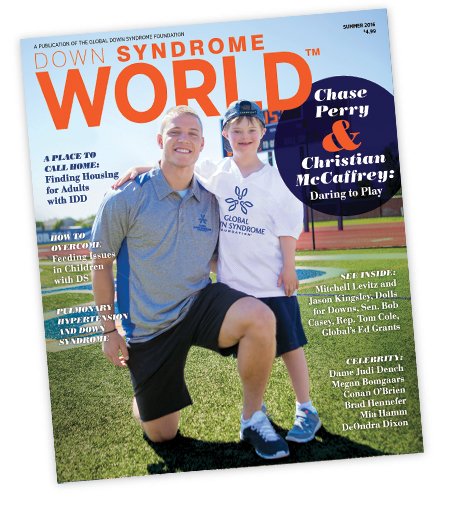Food for Thought: Addressing Feeding and Swallowing Challenges
From Down Syndrome World Summer 2016
By Arwen Jackson, M.A., CCC-SLP; Bridget Harrington, M.A., CCC-SLP; and Carol Spicer, OTR/L, Anna and John J. Sie Center for Down Syndrome, Children’s Hospital Colorado

It’s important to identify and treat feeding and swallowing issues early to ensure your child with Down syndrome gets the most out of every healthy meal.
Children with Down Syndrome can encounter problems with feeding or swallowing due to physical, medical, or behavioral issues associated with their condition. Low muscle tone , sensory problems, food refusal, low endurance, or issues with oral motor skill development can all lead to problems that make eating difficult. This creates stress for children and their parents and can ultimately interfere with a child’s ability to grow and thrive.
A safe and enjoyable meal begins with attending to your child’s cues and supporting where he or she is developmentally.
BUILDING UP BABY
Both breast- and bottle-feeding help babies grow and develop oral motor skills. Beyond looking at your baby’s mouth, it is critical to observe the coordination of breathing and swallowing, the level of alertness, and beginning postural control. Babies do best with latching when they are in an awake, alert state. To help babies stay awake, talk to them, stroke their feet, or change their diapers.
 This article was published in the award-winning Down Syndrome World™ magazine. Become a member to read all the articles and get future issues delivered to your door!
This article was published in the award-winning Down Syndrome World™ magazine. Become a member to read all the articles and get future issues delivered to your door!
A pediatrician may suggest working with specialists, such as those at the Feeding Clinic at the Anna and John J. Sie Center for Down Syndrome at Children’s Hospital Colorado, to develop a safe and effective feeding plan that can be adapted to babies who breast-feed, bottle-feed, or both.
CAREFUL OBSERVATION
A parent’s power of observation is crucial in detecting issues with feeding and swallowing. Look for signs of swallowing difficulties, such as red watery eyes, coughing, choking, congestion, and chronic pulmonary or respiratory illness. Any of these could indicate dysphagia, or difficulty swallowing, which requires further medical investigation.
During meals, feeding difficulties may appear as prolonged or no chewing, overstuffing the mouth, and pocketing food. Behavioral signs related to feeding issues can include, but are not limited to, food refusal, inability to sit at the table, unwillingness to try new foods, or willful gagging and vomiting.
If your child is overstuffing his or her mouth, place two or three bites of food on a plate at a time and continue offering small servings. Children often have difficulty controlling the impulse to stuff their mouths when offered a full plate of food.
Poor postural stability also affects children’s ability to sit and actively participate in feeding themselves. If they cannot hold their heads up independently or have difficulty sitting, eating safely is more challenging. To improve posture, try holding your child in a more upright position on your lap or placing small towel rolls on either side of the trunk while in a high chair. This may offer enough support to free up the child’s hands for food exploration and self-feeding.
SETTING THE TABLE
If your child appears to have behavioral or sensory issues with food, try these tips to set him or her up for success:
- Lay the groundwork for fun and exploration before mealtime. Let children have a voice in what they want to eat and allow them to help with meal preparation — make a smoothie together, for example. Allow them to experience the sensory side of preparing food by touching, smelling, and of course, tasting the ingredients.
- Eat at their eye level. Children learn eating skills by watching you, so it’s important that you model these skills at their eye level.
- Listen — even when your child isn’t saying anything. Young children with Down syndrome may take longer to chew and swallow food than typical children. Don’t rush them. Understand that nonverbal cues, such as pushing a spoon away or turning the head to the side, are your child’s way of saying, “I’m not ready for another bite yet.” Respecting these signs builds trust, which is the foundation of a successful feeding relationship.
Finally, remember that every child is different and a one-size-fits-all approach to treating feeding and swallowing challenges may not work. Pediatricians and specialists can be invaluable resources, assisting parents in developing evidence-based, individualized feeding plans to help children find mealtime success.
PERSISTENT PROBLEMS
Feeding and swallowing challenges can follow individuals with Down syndrome into adulthood. If this happens, it’s important for friends, family, and caregivers to encourage or provide consistent, structured mealtimes.
Being attentive to adults’ feeding behaviors is important, as some people may not be able to verbalize that a problem, such as a cavity or pain when swallowing, is present. Refusal to eat, sudden shifts in food choices and nutrition level, and changes in normal feeding behavior may be clues that something is amiss.
READ MORE
The following resources provide additional information for parents whose children with Down syndrome have feeding and swallowing issues:
- Child of Mine: Feeding with Love and Good Sense by Ellyn Satter (Third Edition, Bull Publishing Company, 2000)
- Gross Motor Skills in Children with Down Syndrome: A Guide for Parents and Professionals by Patricia C. Winders (Woodbine House, 2007)
- Feeding Matters: feedingmatters.org
- “Healthy Eating Habits in Children with Down Syndrome,” National Down Syndrome Society: www.ndss.org/resources/nutrition/
Find a medical care center near you that specializes in treating patients with Down syndrome at www.globaldownsyndrome.org/research-medical-care/medical-care-providers.
Like this article? Join Global Down Syndrome Foundation’s Membership program today to receive 4 issues of the quarterly award-winning publication, plus access to 4 seasonal educational Webinar Series, and eligibility to apply for Global’s Employment and Educational Grants.
Register today at downsyndromeworld.org!
Recent Posts
- Clarissa Capuano & Midori Francis: Positivity & Authenticity
- Alex and Anthony: Out of the Box, Into the Spotlight
- GLOBAL LEADERS – An Exclusive Interview with Erin Suelmann, Executive Director of the Down Syndrome Association of Greater St. Louis
- Sleep Apnea Across the Lifespan in People with Down Syndrome
- Government Profiles: Robert Aderholt (R-AL) & Tammy Baldwin (D-WI)

 Experience our inspirational and groundbreaking videos and photos. Our children and self-advocates are beautiful AND brilliant!
Experience our inspirational and groundbreaking videos and photos. Our children and self-advocates are beautiful AND brilliant! Make sure your local Representatives are on the Congressional Down Syndrome Task Force.
Make sure your local Representatives are on the Congressional Down Syndrome Task Force.